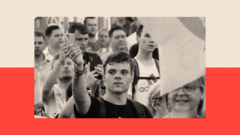In a dimly lit bar in Freiberg, Saxony, 19-year-old Nick shares his thoughts on an unsettling trend: many young German men are gravitating toward the far-right Alternative für Deutschland (AfD) party. "My parents lived without fear," he reflects, articulating a desire to feel safe in his own country, amid rising concerns surrounding immigration and asylum seekers. The AfD has become a significant political force, polling consistently well in recent months, particularly among younger demographics.
The AfD, often accused of anti-immigrant rhetoric, has gained traction following a series of violent incidents involving asylum seekers, fueling sentiments like Nick's. Dominic, a 30-year-old friend of Nick, expresses a nuanced view on immigration, highlighting a distinction between those who integrate and those he perceives as exploiting the asylum system. Yet, he notes, voicing such views can be politically perilous in Germany, where references to the Nazi past loom large.
Recent data from Pew Research illustrates a stark gender divide, with 26% of German men supporting the AfD compared to only 11% of women. An increasing number of young voters, particularly under 24, have chosen the AfD, marking a sharp rise from previous years. The underbelly of this trend is anxiety; a study from the German Institute for Generational Research points out that young men concerned with conservative values often find themselves alienated by topics like feminism, prompting them to seek refuge in far-right ideologies.
Social media platforms, particularly TikTok, also play a crucial role in the dissemination of far-right ideas. With a robust following that outpaces mainstream parties, the AfD's presence allows for an alternative political narrative that bypasses traditional media channels, which many supporters view as antagonistic. Influencers like Celina Brychcy have accrued significant followings by combining lifestyle content with pro-AfD messages, indicative of a rising trend among youth to blend personal branding with political advocacy.
This shift isn't solely about economics or immigration—it's intertwined with cultural identity and gender roles. Younger men resisting what they perceive as "role reversal" in societal norms are often drawn to the AfD's stances, particularly regarding immigration and traditional gender constructs. These sentiments are echoed in academic settings, where educators like Diana Schwitalla have confronted disturbing attitudes, including Holocaust denial among students and glorification of historical figures like Hitler.
While the AfD's policies resonate with a faction of young people seeking radical change, mainstream parties continue to distance themselves, reinforcing the AfD's position as a far-right entity within German politics. Experts caution that if mainstream parties resume including the AfD in political discourse, the normalization of such ideologies could have long-term ramifications for Germany's political landscape. As young voters increasingly support extremes on both ends of the political spectrum, the implications for the future of German democracy remain profound and worrying.
The AfD, often accused of anti-immigrant rhetoric, has gained traction following a series of violent incidents involving asylum seekers, fueling sentiments like Nick's. Dominic, a 30-year-old friend of Nick, expresses a nuanced view on immigration, highlighting a distinction between those who integrate and those he perceives as exploiting the asylum system. Yet, he notes, voicing such views can be politically perilous in Germany, where references to the Nazi past loom large.
Recent data from Pew Research illustrates a stark gender divide, with 26% of German men supporting the AfD compared to only 11% of women. An increasing number of young voters, particularly under 24, have chosen the AfD, marking a sharp rise from previous years. The underbelly of this trend is anxiety; a study from the German Institute for Generational Research points out that young men concerned with conservative values often find themselves alienated by topics like feminism, prompting them to seek refuge in far-right ideologies.
Social media platforms, particularly TikTok, also play a crucial role in the dissemination of far-right ideas. With a robust following that outpaces mainstream parties, the AfD's presence allows for an alternative political narrative that bypasses traditional media channels, which many supporters view as antagonistic. Influencers like Celina Brychcy have accrued significant followings by combining lifestyle content with pro-AfD messages, indicative of a rising trend among youth to blend personal branding with political advocacy.
This shift isn't solely about economics or immigration—it's intertwined with cultural identity and gender roles. Younger men resisting what they perceive as "role reversal" in societal norms are often drawn to the AfD's stances, particularly regarding immigration and traditional gender constructs. These sentiments are echoed in academic settings, where educators like Diana Schwitalla have confronted disturbing attitudes, including Holocaust denial among students and glorification of historical figures like Hitler.
While the AfD's policies resonate with a faction of young people seeking radical change, mainstream parties continue to distance themselves, reinforcing the AfD's position as a far-right entity within German politics. Experts caution that if mainstream parties resume including the AfD in political discourse, the normalization of such ideologies could have long-term ramifications for Germany's political landscape. As young voters increasingly support extremes on both ends of the political spectrum, the implications for the future of German democracy remain profound and worrying.


















